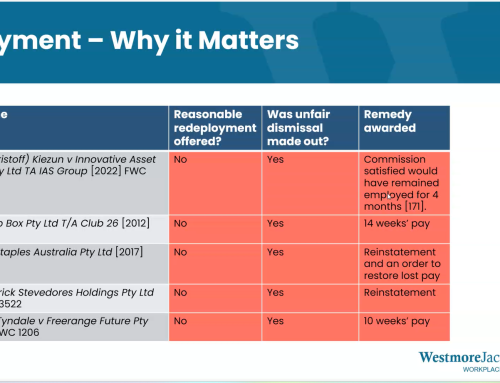
This is the second part of our Employment Law Update for medical practices.
This part of our article discusses two topics. The first is when a prior period of casual employment may count for the purpose of calculating redundancy payouts.
The second is when an employee can use a medical report created after their dismissal to challenge a dismissal based on their incapacity.
The first part of our Employment Law Update was published in August. That part of our update discussed the inclusion of unpaid family leave entitlements into all modern Awards, including the Nurses Award 2010 and the Health Professionals and Support Services Award 2010.
It also discussed a number of significant Full Bench decisions of the Fair Work Commission that have increased the circumstances in which an employee can bring an out-of-time unfair dismissal application. The first part of our Update is available here.
Recently, another significant decision has been handed down: WorkPac Pty Ltd v Skene
Casual Employment May Not Always Count Towards a Redundancy Payment
In medical practices, support staff and nursing staff will often be engaged as casual employees. It is also not uncommon for a casual staff member to be offered full or part-time permanent employment after being engaged with the practice for a period of time. This may have implications where these staff members are made redundant.
The Full Bench of the Fair Work Commission has reconsidered whether a permanent employee’s prior casual service is included when calculating redundancy entitlements.
The Full Bench held in Unilever v AMWU [2018] FWCFB 4463 that Unilever did not have to include a permanent employee’s prior casual service when calculating that employee’s redundancy payout.
This is a possible departure from the earlier majority decision in Donau v AMWU [2016] FWCFB 3075. In that case the Full Bench held that employers must include prior casual service when calculating the length of a permanent employee’s continuous service under the National Employment Standards (“NES”).
Whether Unilever overrules Donau is not entirely clear. The two cases involved interpretation of different enterprise agreements. The difference in the terms of the agreements may explain the divergence of outcomes.
The enterprise agreement in Donau provided, in effect, that employees’ entitlements were calculated by reference to the NES. The majority held that the definition of “continuous service” under the NES included prior casual service.
In contrast, the enterprise agreement in Unilever specifically stated that its redundancy provisions “did not apply to casual or seasonal employees”. The Full Bench held that this exclusion operated to exclude any prior casual service from redundancy calculations.
In concluding their decision in Unilever, the Full Bench cast doubt over the applicability of Donau. In this regard, the Full Bench commented:
…[Donau] turned on its own facts. It should not be understood as establishing any principle about the application of [the NES definition of service and continuous service] to casual employment, or the approach to calculating service in enterprise agreements.
The Full Bench’s comments in Unilever suggest that it may no longer be willing to include prior casual service in a permanent employee’s continuous service, even where that service is calculated in accordance with the NES (which is the case for the Nurses Award 2010 and the Health Professionals and Support Services Award 2010). This area of law has become unclear following the Unilever decision.
Employees May Be Able to Use Medical Reports Created Post-Dismissal to Challenge Their Dismissal
In September 2017 we published an article which discussed dismissing employees for incapacity to perform the inherent requirements of their job.
Since that publication the law has changed again. The Full Bench has made two decisions which change the law regarding dismissals for incapacity to perform the inherent requirements of the job.
These decisions are CSL Behring v Papaioannou [2018] FWCFB 1005 and Hyde v Serco Australia [2018] FWCFB 3989. This section discusses Hyde. The changes in CSL Berhing are significant. Consequently, we plan to publish a separate article discussing the changes in CSL Behring in the near future.
In Hyde, the employer dismissed an employee following a medical report which said, among other things, that the employee could not perform the inherent requirements of his job. Some two months after their dismissal, the employee obtained a medical report which said he could perform the inherent requirements of the job.
In defending the employee’s subsequent unfair dismissal application, the employer argued that the first medical report gave them a valid reason to dismiss the employee based on an incapacity to perform the job’s inherent requirements.
The Full Bench considered whether a medical report created after a dismissal could undermine an employer’s argument that they had a valid reason to dismiss an employee based on an incapacity to perform the inherent requirements of the job.
In effect, the Full Bench held that a medical report created after a dismissal regarding an employee’s capacity could undermine an employer’s argument that they had a valid reason to dismiss an employee for incapacity based on a medical report.
However, the Full Bench held, the medical report must relate to the employee’s capacity at the time of dismissal. If the report relates to the employee’s capacity at the time of assessment (ie. post-dismissal), it will not be relevant (or perhaps have little relevance) to whether the employee was capable of performing their job’s inherent requirements.
In Hyde the report was the latter type. It related to the employee’s capacity two months after dismissal. Consequently, the Full Bench did not consider the report when determining whether the employer had a valid reason to dismiss the employee for incapacity.
If a report undertaken post-dismissal does relate to the employee’s capacity at the time of dismissal, the Commission will regard it with varying levels of significance. In Hyde the Full Bench noted:
The probative value of such evidence will depend, in part, on the nature of the applicant’s condition and the time between dismissal and assessment.
Following this decision, practices should be cautious when dismissing an employee for incapacity to perform their job’s inherent requirements. Employees may be able to use conflicting medical assessments to challenge their dismissal even if that assessment is conducted after their dismissal.
Adam Colquhoun
Principal, WestmoreJacobs
This article is general information only. It is not legal advice. If you need legal advice, please contact us.






Leave A Comment